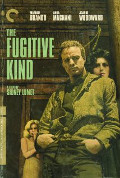
Directed by
Sidney Lumet
119 minutes
Rated M
Reviewed by
Bernard Hemingway

The Fugitive Kind
Although released in 1960, Sidney Lumet's faithful rendition of Tennessee Williams' marvellously overwrought play "Orpheus Descending", now called The Fugitive Kind, is grounded in the 1950s.
The wonderful black-and-white photography by Boris Kaufman who had shot both Lumet’s 1957 feature debut, 12 Angry Men and Brando in the 1954 classic On The Waterfront stamp the film with a distinctive period look whilst both Brando and Williams were veterans of the 1951 classic A Streetcar Named Desire.
The Fugitive Kind began life as "Battle of Angels", an unproduced 1939 play by a young Tennessee Williams which the author revised nearly 20 years later. Brando plays Valentine "Snakeskin" Xavier, a guitar-totin' itinerant who wanders into a rundown Mississippi town and becomes involved with an unhappily married woman, Lady Torrance (Anna Magnani), and the equally unhappy well-to-do hellcat Carole Cutrere (Joanne Woodward) thereby becoming the target for the town’s Sheriff (R.G. Armstrong) and Lady’s embittered husband (a brilliantly evil Victor Jory).
The film, adapted by Williams and Meade Roberts, has its problems. Much as with The Wild One (1954) Brando is far too pretty (even the cast can't help but remark on it) for the role of an itinerant "entertainer" a pseudonym for . Although the score by Kenyon Hopkins is quite effective and Lumet fumbles his supposed musical allegiances. The names of Leadbelly and Blind Lemon Jefferson are invoked as “jazz” exemplars and Val’s music heroes but the sight and sound of Brando pretending to sing the blues and clearly faking it is not a pretty one. Also on the downside, the relationship between Val and Carole Cutrere is far too schematic to hold much weight whilst Maureen Stapleton's spiritualist painter is also given short shrift.
But all that disappears beneath the merciless onslaught of Williams’ high-flown literary portrayal of bigotry, moral decay and sexual repression in the Deep South. Brando and Magnani both give wonderful performances as the two lovers whose tilt at happiness is destroyed by the sadistic propriety of “decent folk”. Lumet allows the relationship to build gradually with the help of Kaufman’s lighting shaping the film around the pair. Magnani initially might seem miscast particularly as there is no attempt to explain why Lady is married to such a nasty piece of work (at times she seems to struggle with English and there are some intrusive audio cuts where I assume her dialogue was dubbed post-production but she brings a wonderful earthy emotionality to the role. Brando, who looks younger than his 36 years (the camera fairly dotes on his good looks) is in top-notch form as the cryptically laconic vagrant and why his performance here isn’t better known is a mystery.
Want something different?





